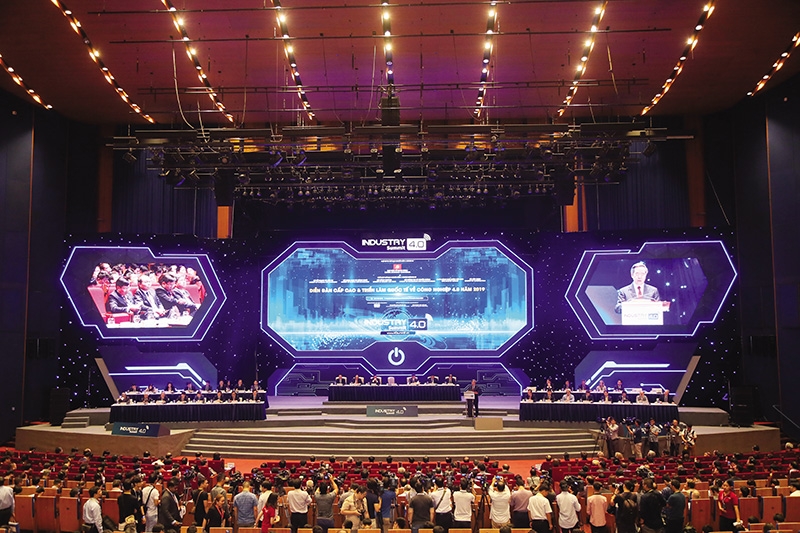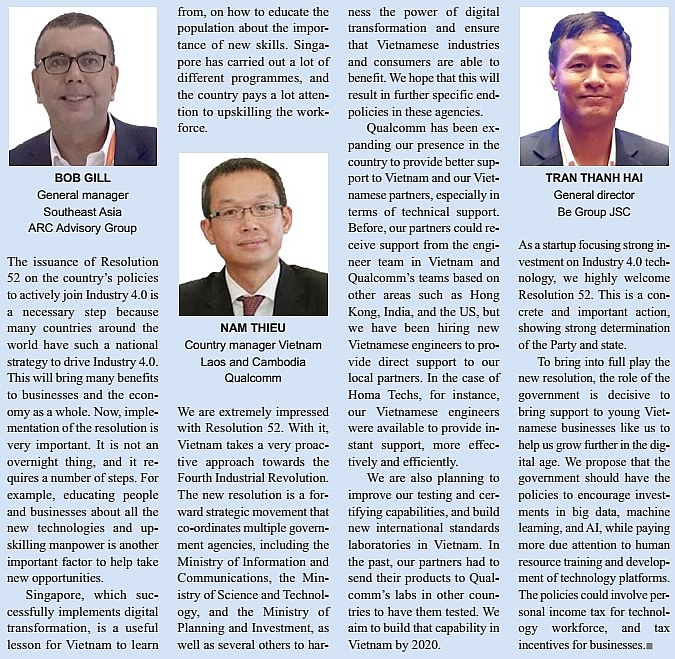Resolution to aid 4.0 breakthrough
 |
| The digital economy could account for nearly a third of GDP in less than a decade, Photo: Duc Thanh |
Setting foot in Vietnam for the first time last week to attend the Industry 4.0 Summit, Penny Baldwin, chief marketing officer at Qualcomm, the global leader in 5G tech, expressed her appreciation of technology application in Vietnam, where there are 143.3 million mobile phone subscriptions, and which has jumped three spots to rank 42nd out of 129 economies on the Global Innovation Index 2019.
“With Vietnam planning to deploy 5G commercially by 2020, we are going to expand our footprint in the country to benefit from growing market demands,” said Baldwin.
Qualcomm is among several global technology groups that are developing plans for Vietnam in this race, together with Vietnamese tech mainstays such as Viettel, VNPT, and FPT. Other names such as Ericsson, Dell, Huawei, IBM, and HP are interested in smart banking, smart city, smart manufacturing, smart energy, and the digital economy.
In new developments, Ericsson is working with Vietnamese partners to support the commercial launch of 5G in Vietnam next year, following the launch of the first 5G call in mid-2019 with Viettel.
Microsoft, Dell, Amazon, and HP are reportedly looking to shift substantial amounts of their Chinese production capacity elsewhere, and Vietnam is among their next potential destinations.
HP and Dell are reported to command approximately 40 per cent of the global personal computer market and plan to shift up to 30 per cent of their laptop production out of China.
Similarly, CMC Corporation has also been making moves, including a license to provide digital signature authentication service, the establishment of CMC Technology and Solutions Company, and announcement of CMC’s strategy for Vietnam to become the “Digital Hub” of the Asia-Pacific, aiming to make revenue of $1 billion by 2023.
This trend is expected to be further reinforced with the Vietnamese Politburo’s Resolution No.52-NQ/TW dated September 27 on a number of guidelines and policies to proactively participate in Industry 4.0.
Major policy reform ahead
While having strong interest in the area, both provinces and businesses have concerns over the lack of e-government and smart city framework, information security policy, development of digital transformation infrastructure, and more which are hindering their next steps, which requires solutions from the government.
Resolution 52 is the Party’s first comprehensive resolution on Vietnam’s orientation and policy to join Industry 4.0, showing the country’s strong determination to increase its readiness to digital transformation amid technology disruption, and aiming to increase the digital economy to 30 per cent of GDP by 2025.
The key content of this directing policy is to boost sci-tech development and innovation in all sectors, and promote national digital transformation with a focus on the digital economy, smart cities, and e-government.
“The nature of Industry 4.0 is the revolution of institutional policies. With the rapid development of digital technology, new business models and a new labour force are created, thus making many existing policies unsuitable. It requires change to the policies and mindset in management,” said Nguyen Van Binh, head of the Central Economic Commission.
In the resolution, special breakthrough policies will be applied to innovation centres, and supporting policies will be built for prioritised sectors and technologies, thus creating favourable conditions and supporting infrastructure development investment and human resources development, and more.
In addition, a legal framework and policies will be built for the development of new technologies and supporting programmes for research and development. The policies for development of high-tech parks in Hanoi, Ho Chi Minh City, and Danang will be perfected, while promoting the development startup ecosystem and establishing innovation centres in these cities.
Addressing the summit, Nguyen Chi Dung, Minister of Planning and Investment, pointed out the solutions to successfully realise the goal. They include attracting foreign investment in R&D and innovations, investment projects, and manufacturing of products and services based on Industry 4.0 tech, and attracting global technology leaders and venture funds for Vietnamese startups.
 |
Last week, Prime Minister Nguyen Xuan Phuc issued Decision No.1269/QD-TTg on the establishment of the Vietnam National Innovation Centre (NIC) under the Ministry of Planning and Investment. The NIC’s construction is scheduled for completion by the end of 2020, by which point incentives will be made available.
Dung went on to elaborate that his ministry is working on the National Strategy on Industry 4.0, focusing on the three key factors of policy reform, development of connection infrastructure, and skilled human resources training.
At present, ministries and relevant agencies have been assigned specific tasks to implement the resolution. According to Deputy Prime Minister Vu Duc Dam, in addition to concrete master plans and programmes, the government will soon issue an action plan to implement Resolution 52.
It is expected that with the strong and concrete developments to be deployed by the government, Qualcomm, Dell, HP, Ericsson, Huawei, and others will get more new opportunities in Vietnam.
What the stars mean:
★ Poor ★ ★ Promising ★★★ Good ★★★★ Very good ★★★★★ Exceptional
Related Contents
Latest News
More News
- SK Innovation-led consortium wins $2.3 billion LNG project in Nghe An (February 25, 2026 | 07:56)
- THACO opens $70 million manufacturing complex in Danang (February 25, 2026 | 07:54)
- Phu Quoc International Airport expansion approved to meet rising demand (February 24, 2026 | 10:00)
- Bac Giang International Logistics Centre faces land clearance barrier (February 24, 2026 | 08:00)
- Bright prospects abound in European investment (February 19, 2026 | 20:27)
- Internal strengths attest to commitment to progress (February 19, 2026 | 20:13)
- Vietnam, New Zealand seek level-up in ties (February 19, 2026 | 18:06)
- Untapped potential in relations with Indonesia (February 19, 2026 | 17:56)
- German strengths match Vietnamese aspirations (February 19, 2026 | 17:40)
- Kim Long Motor and AOJ Suzhou enter strategic partnership (February 16, 2026 | 13:27)

 Tag:
Tag:




















 Mobile Version
Mobile Version